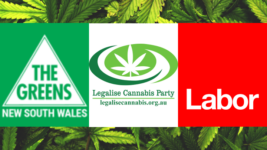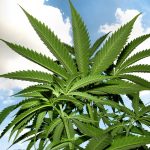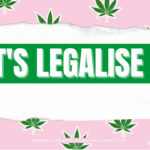NSW Should Regulate Adult Cannabis Use Immediately, Then Enact a Legalised Market

Cannabis is being legalised the world over. And the reports coming out of those jurisdictions where the plant has been legalised in one form or another speak of nothing but positive results, whether that be in terms of public wellbeing, profit margins or crime rates.
In some nations, it’s been a matter of rights. South Africa’s highest court ruled in 2018 that citizens have the right to use and grow at home. Whilst Mexico’s top court ordered the government to legalise recreational use in mid-2021, as criminalisation of cannabis is unconstitutional.
The United States actually kicked off the legalisation trend in late 2012, when the constituencies of Washington and Colorado voted to make recreational use a retail choice, with the total number of states to have legalised in some form now at 22.
And the Uruguayan, Canadian, Thai, Maltese and Portuguese governments have all legalised cannabis nationwide.
But before getting stuck into Australia as some antiquated outlier on this issue, it must be said that in actual fact, the Labor-Greens government in the Australian Capital Territory legalised the adult personal home use and cultivation of cannabis commencing on 31 January 2020.
And rather than observing from the sidelines what’s happening in regard to foreign climes, Australians should be embracing our nation having already embarked down the legalisation path, and with its new forward-thinking premier, this state would be the best placed to lead the way.
Let’s do it now
The Australian Greens has been calling for the nationwide legalisation of cannabis since 2018. Greens Senator David Shoebridge is currently running the Legalise It campaign federally, which has been gaining traction on national television stations, where it’s now being discussed as plausible.
While in NSW, Greens MLC Cate Faehrmann is about to introduce her renewed Legalise Cannabis Bill 2023 into state parliament, which will seek to regulate the supply, sale and use of the legalised plant, whilst putting restrictions on the advertising of such products, as well as providing for homegrow.
And with the success of the regulated retail market in Colorado, which made its first sale on 1 January 2014 and has since become a multibillion-dollar industry, drawing in hundreds of millions in tax revenue funnelled back into the community annually, legalising domestically is a no-brainer.
But since Legalise Cannabis MLC Jeremy Buckingham entered NSW parliament in March, that party, in the jurisdictions where it holds seats, which includes Victoria and WA, went on to announce in June that it’s tabling legislation in all three states to regulate legal personal adult use and homegrow.
And at first glance this appears to create a dilemma as to which way to proceed: regulating adult use or creating a regulated retail market catering to adult use?
But a moment’s pause reveals clearly that both proposals are warranted, and the criminalisation of personal use in this state should end immediately.
Legal adult use now
Despite the findings of the NSW ice inquiry and the NSW coronial inquiry into drug-related deaths at music festivals under the Coalition, the Minns Labor government is sticking to its proposal to hold a drug summit, similar to the groundbreaking 1999 parliamentary law reform meeting, next year.
In having spoken to Sydney Criminal Lawyers about their bills, both Faehrmann and Buckingham suggested that their proposals are likely to be held off until the summit. Indeed, the NSW Greens MLC, whose been championing this issue for a number of years now, lamented the wait.
Yet, if Labor is going to hold off on deliberations about a regulated cannabis market until then, it ought to follow the Legalise Cannabis proposal immediately, because, as Buckingham points out, it won’t result in any noticeable changes for locals who don’t have anything to do with cannabis now.
The various state Legalise Cannabis parties are calling for the revoking of laws that make it a crime to personally possess and use cannabis, up to 50 grams being the suggested limit, along with the ability to lawfully grow up to six of the plants at home to cover one’s personal use.
What that would do is result in roughly 10 percent of the adult NSW community no longer randomly being targeted by laws that at present leave it up to NSW police officers to make the call on whether to formally charge an individual for personal drug possession or let them go with a caution.
And the only sector of society that these laws would negatively impact are the large illegal producers and suppliers of cannabis, regularly known as the black market, as the ability to grow one’s own legally at home, will suddenly cut into its demand.
A precedent set
No one has heard a peep out of Canberra regarding any negative impacts resulting from legalised personal adult use down there since it began. And in the capital territory the shift towards legal use was ushered in by Labor MLA Michael Pettersson.
While Labor has just returned to power in NSW, after over a decade in opposition, and state premier Chris Minns is on the record as having told a meeting of pro-drug law reform Labor MPs in 2019, that it’s “time for Labor to have a big debate that includes a commitment to legalising this drug”.
And what of those pro-drug law reform Labor MPs? Surely, it must appear to them that with the party now in power after so long, the time for the removal of criminal sanctions against people privately using cannabis at home should be right now.
Not only would this free up the NSW Police Force to pursue real crime, but it would further no longer leave it up to the discretion of individual officers to pick and choose who’s pursued.
As it stands the legalised use of alcohol is sacrosanct in Australia, and all the studies point to the consumption of cannabis as causing much less harms, both to the user and society as a whole, than drinking does.
Launched by the US Nixon administration in 1971, the drug war encourages an aggressive zero-tolerance approach to people who use drugs, and it’s been admitted that this initiative was designed to facilitate the criminalisation and the ability to police Black people and left-wing radicals.
So, the only possible reason not to immediately advance legal adult cannabis use would be that law enforcement would lose some advantage it gains from a sizable portion of the population being criminalised and warranting their attention all for the possession of a tiny piece of grass.
And as a NSW Bureau of Criminal Statistics and Research report found last month, over the 38 months to February 2020, only 12 percent of Aboriginal adults found in possession of cannabis were issued with a caution by state police, whilst 44 percent of their non-Indigenous counterparts were.







